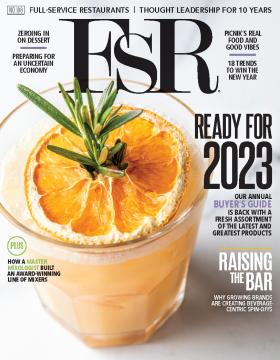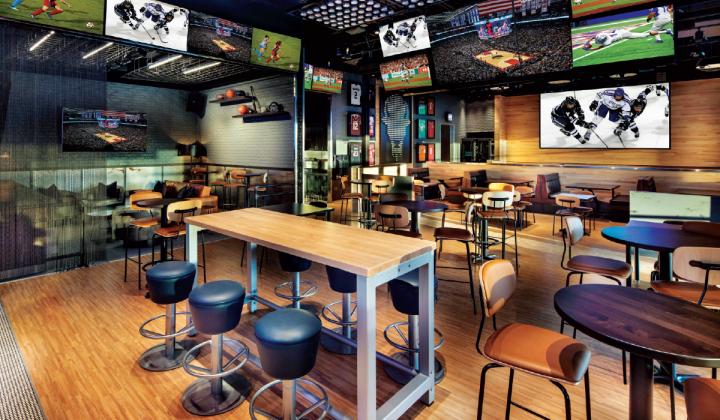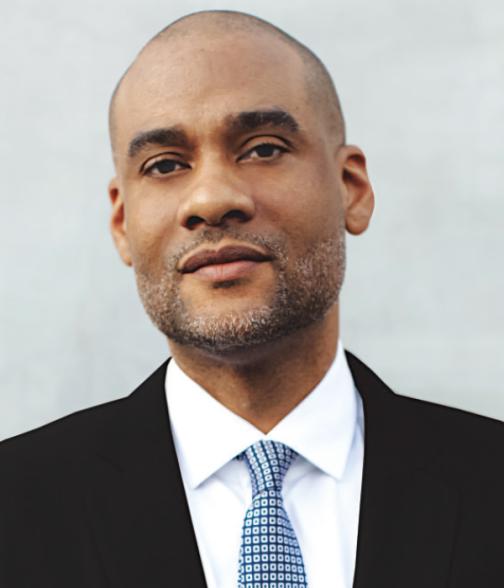When Buffalo Wild Wings and Arby’s merged and formed Inspire Brands in 2018, Webb brought his perspective and insight to the company while serving on the Franchise Advisory Council (fac). Now, he’s investing in the future leaders of foodservice at his restaurants while working to ensure people in under-resourced communities have access to equity and ownership opportunities.
What sparked your interest in civic engagement?
I was operating a store on Crenshaw [Boulevard], which is in South Los Angeles, and my mother’s high school alma mater is blocks away. I was invited to the school [where] they had an entrepreneurial program, developed a relationship with the teacher that taught the program, and then I ended up teaching a class there. Other stakeholders of Buffalo Wild Wings were very supportive. And we ended up teaching the kids how to open a pop-up restaurant, going through the entire process of supply chain, menu development, pricing strategy, how to do food cost, how to do all of this stuff, and what to consider as an example of any other kind of business endeavor. And it was super fulfilling, so I really got engaged around at-risk youth within all of that.
How does your experience as a franchisee of Buffalo Wild Wings and Inspire Brands inform your approach to entrepreneurial activism?
We were very successful there, and it lent itself to a lot of civic engagement and community engagement. We added a lot of value and got noticed for it, and the community really responded to it in the success of that store, and at the time, so did Buffalo Wild Wings. So I was invited to be a member of the FAC, and served on the marketing subcommittee as well, and was in that role at Buffalo Wild Wings when Inspire Brands and Paul Brown acquired Buffalo Wild Wings. And so I brought a perspective to the table amongst the FAC. At the time, being the only African American, operating some urban locations, operating on the West Coast and L.A. specifically, being younger than most of the people that were on the FAC, and really kind of wanting to push the brand around some more contemporary approaches to our marketing, advertising, and engaging cultural relevance.
How can franchising in the foodservice industry be a tool for increasing social equity?
Having had my family’s [experience of owning] 16 McDonald’s [locations], and us having Buffalo Wild Wings and growing, you just see the number of people who don’t have the equity to compete to be typical franchisees, but could lead teams, and could understand things outside of just what general managers do. They do inventory, they hire teams, they manage teams all day long, but they are not getting the lion’s share of the profitability, because that’s not how the typical model is set up. And, if you want to improve income inequality, if you want people in under-resourced communities to accelerate their outcomes, if you want to improve under-resourced communities, people have to own businesses.
What kinds of social strategies have you implemented in your Buffalo Wild Wings restaurants?
We do centralized orientation, and when people come and watch that video, they see me tell them that if they show up and do the right things, then my Rolodex belongs to them. And so, if you’re in television and film, and you’re working at Buffalo Wild Wings part-time or as a bartender or server and there’s something that you want to do, if I know somebody that can help you, I’m going to lend that to you. It’s available, and people use it. I have an hour of office hours every Monday, and anybody can call me and use those office hours, whether it’s on Zoom or in person. I will give anybody a half an hour to learn about what you’re trying to do, or if you have an issue with your family, or just trying to figure out what [your] plan for life is— maybe I can help you avoid a couple of missteps or accelerate the outcomes you’re looking for.
It’s also the consistency in our communication. And so we share all of the financial information of our business, and we teach it so that the behavior and the activities and the coaching of the managers on the floor is consistent with the objectives of the business. And they understand the why; it’s not just like, well do this because this is the SOP or do this because this makes us more money. No, it’s do this, because this is what the bank covenants are, and in order to achieve the bank covenants and have the ability to grow, and to be financially graded in a way where we’re expandable by our franchisor and the bank. And when we create more opportunities, there are more opportunities within the organization for you to grow.
What advice would you give to other restaurant leaders who want to make a positive social impact at their businesses?
If I had to sum it up, I would just say that, especially in this environment, especially with younger people today, they have so much information, and they are particular about trying to make sure that what they’re getting is, if not in their interest, at least in their desire. This is not an era where people do what you say because you say it, if they don’t believe in it. They need to believe in it. And it’s the right thing to do, but strategically, the best way to get people to believe and to align in what you’re asking them for is to be clear that you’re not trying to prevent them from having what they want, you actually would like to enable it.





%20(1)_099fe.png)











